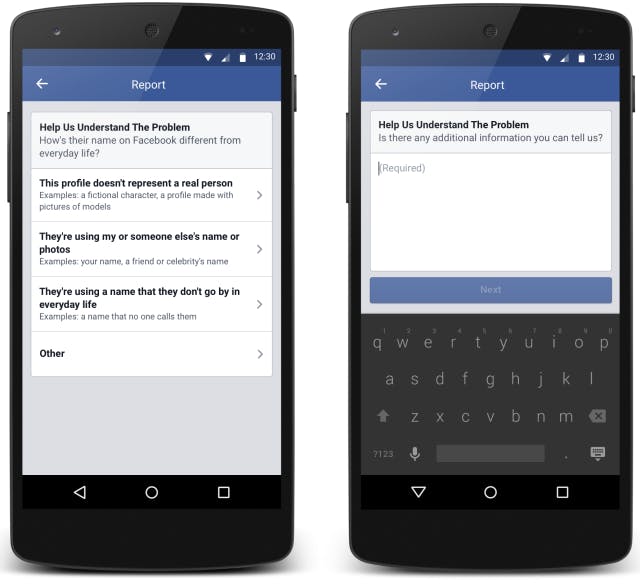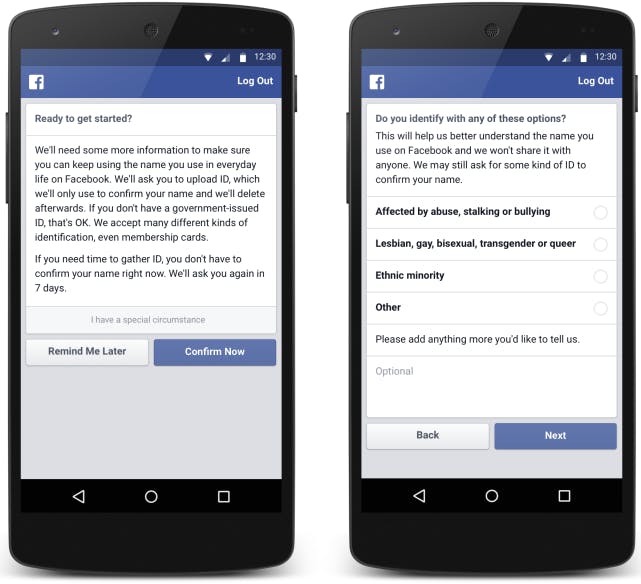After taking considerable criticism for many months now, Facebook has finally made changes to its controversial real name policy. An update to the policy, launching first in the United States, will include a more detailed reporting system as well additional options for users who are asked to verify their identity in some way.
In a post from Vice President of Global Operations Justin Osofsky and Product Manager Todd Gage, Facebook laid out its new tools that aim to “make it easier for people to confirm their name if necessary” while also cutting down on the number of verification requests.
To accomplish these goals, the social network is implementing a new version of the names reporting process that will require the user to undergo several additional steps designed to add context to their individual situation and expedite the review process. Options have been broadened beyond just “fake name” for reporting and now includes choices to indicate stolen identity, fictional accounts, and using a name other than what a person goes by in real life.
For people who have their names called into question, Facebook will provide a more comprehensive tool for responding. Users will be able to choose from a selection of reasons to explain their name on the platform, including options for LGBTQ users, ethnic minorities, and those affected by bullying and online abuse. Additional information can also be provided in a text box, should further context be needed.
While Facebook notes in its post on the topic that the company is “firmly committed” to the real names policy, and notes that the policy itself isn’t changing, the broadening of the reporting process marks an effort to address some of the concerns the policy has raised.
Earlier this year, over 70 human rights groups organizing under the title of the Nameless Coalition signed an open letter directed at Facebook, asking the company to fix its “broken ‘authentic identity’ policy.” The groups that signed on to the letter represented “activists, indigenous, religious, and ethnic minority communities, LGBTQ people, and Internet users,” and included organizations like the American Civil Liberties Union, Electronic Frontier Foundation, Human Rights Watch, and Transgender Law Center.
Deji Olukotun is the Senior Global Advocacy Manager of Access Now, one of the signatories of the letter. He told the Daily Dot, “Facebook’s changes are welcome and they will make it harder for people to discriminate against vulnerable users. It will be more difficult for users to flag drag queens, clergy, and human rights defenders for violating the ‘authentic name’ policy. This can make a real impact in their lives.”
Technology and Civil Liberties Policy Attorney at ACLU of Northern California Matt Cagle, a co-organizer of the Nameless Coalition, told the Daily Dot, “These changes are a step in the right direction. Facebook is acknowledging the importance of online speech that’s not necessarily tied to the name on your ID.”
While groups involved with the letter preferred for Facebook to step away from the names policy entirely, the reform offered by the company indicate progress. Cagle said he believes the changes “will help reduce abusive reporting and allow users to explain the very legitimate reasons they have for speaking with a different name. That ranges from personal privacy to personal safety.”
Over a year ago, Facebook first addressed concerns surrounding the real name policy following protests by drag queens and reports of harassment taking place through excess reporting. The policy has continued to knock activist accounts and many other users off the platform.
The new steps that Facebook has implemented mark the biggest shift in the company’s approach to the problem. Previously, the massive social network expanded the forms of identification that could be used to verify identity and added security protections for documents shared for that purpose. Those efforts were widely considered to be inadequate.
Olukotun hopes the changes to the report system will make a considerable difference for users on the platform. “We’re pleased that users who have been suspended will have a chance to appeal their suspensions to Facebook. This can educate Facebook about the diverse community of users and make the process more fair,” he said.
The updated reporting system will appear immediately for Facebook users in the United States, with plans to roll it out internationally dependent on feedback.
It’s a welcome addition in the U.S., but will remain sorely needed internationally according to Olukotun, who called for Facebook to publish a timeline for rolling out the changes worldwide.
“Unfortunately, cases coming into our 24-hour free Digital Security Helpline show that the authentic name policy still harms human rights defenders, journalists, and others looking for ways to communicate online without fear of retaliation,” he explained.
Cagle echoed these concerns, stating “Our coalition has dozens of groups from around the globe who were effected by this policy. We look forward to this policy being rolled out to all Facebook users.”
The sentiment seems to be the sooner those users have protections and appeals process that provides them with the support they require, the better.
Photo via Bhupinder Nayyar/Flickr (CC BY 2.0)




